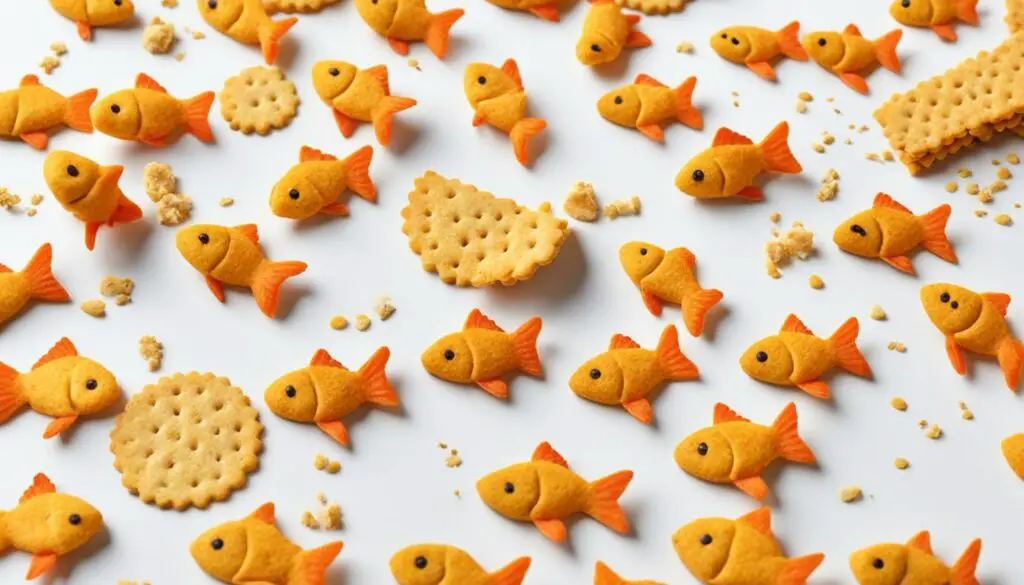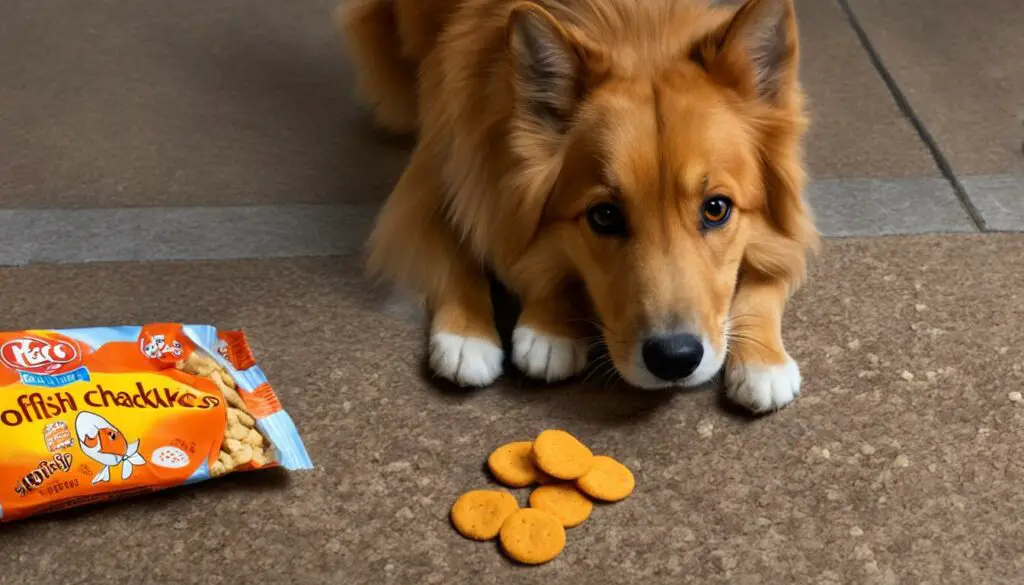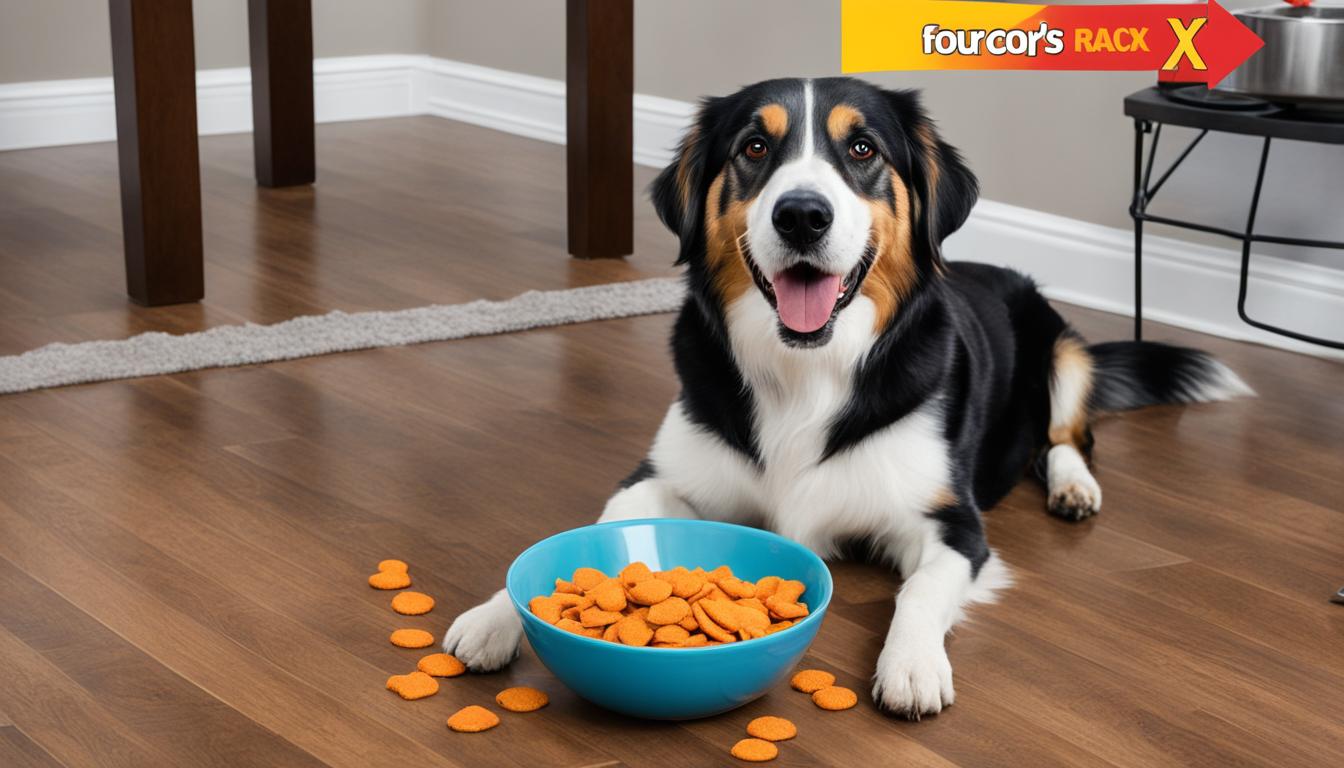Last Updated on 2 years by admin
Goldfish crackers are a popular savory snack enjoyed by many households for their salty and cheesy taste. But can dogs have goldfish? As a responsible pet owner, it’s important to consider the pros and cons before sharing this snack with your furry friend.
While an occasional Goldfish cracker is unlikely to cause harm to dogs, it’s crucial to be aware of the potential risks. Some ingredients in Goldfish crackers, such as salt and onion powder, can be harmful to dogs if consumed in large quantities. Feeding your dog tidbits outside of their regular diet may lead to weight gain and an unbalanced diet. It’s best to consult with your veterinarian for guidance on what snacks are safe for your dog in order to ensure their overall health and well-being.
Key Takeaways:
- Goldfish crackers are not toxic to dogs in small amounts, but they offer little nutritional value.
- Some ingredients in Goldfish crackers, such as salt and onion powder, can be harmful to dogs if consumed in large quantities.
- Feeding your dog tidbits outside of their regular diet may lead to weight gain and an unbalanced diet.
- Consult with your veterinarian for guidance on what snacks are safe for your dog.
- Offer your dog healthy alternatives such as plain popcorn, vegetable sticks, lean strips of cooked meat, and fruits.
Are Goldfish Crackers Safe for Dogs?

Goldfish crackers are a popular snack enjoyed by many, but can they be safely shared with our furry friends? While small amounts of Goldfish crackers are generally not toxic to dogs, they offer little nutritional value and can potentially be harmful in larger quantities.
The primary concern with Goldfish crackers and dogs lies in the ingredients used in their production. A notable ingredient is salt, which can be harmful to dogs if consumed in excessive amounts. Additionally, some Goldfish crackers contain onion powder, which can damage a dog’s red blood cells and cause anemia.
Although Goldfish crackers are not inherently toxic to dogs, they are not an ideal snack for them either. Dogs should not regularly consume Goldfish crackers as they lack the necessary nutritional benefits and can contribute to weight gain. It’s crucial to prioritize a balanced and nutritionally complete diet specifically formulated for dogs to meet their unique dietary needs.
To provide a clear understanding of the potential risks and benefits, here is a breakdown:
| Pros | Cons |
|---|---|
| Goldfish crackers are not toxic to dogs in small amounts. | Some ingredients in Goldfish crackers, such as salt and onion powder, can be harmful to dogs if consumed in large quantities. |
| – | Dogs should not regularly consume Goldfish crackers as they offer little nutritional value and can lead to weight gain. |
| – | Goldfish crackers may contain dyes and additives that can cause symptoms of ill health in some dogs. |
Overall, while an occasional Goldfish cracker is unlikely to cause harm to your dog, it’s best to avoid regularly feeding them this snack. Instead, focus on providing your dog with a balanced and nutritionally complete diet. If you have concerns about your dog’s diet or suspect they have consumed a significant quantity of Goldfish crackers, it’s always wise to consult with your veterinarian for guidance and support.
Potential Health Risks of Goldfish Crackers for Dogs

While goldfish crackers may seem like a tasty and harmless snack, they can pose potential health risks to our canine companions. It’s important for dog owners to be aware of these risks to ensure the well-being of their furry friends.
High Salt Content
Goldfish crackers contain high levels of salt, which can be dangerous for dogs. Consumption of excessive salt can lead to dehydration and sodium ion poisoning in dogs. These conditions may cause symptoms such as excessive thirst, increased urination, vomiting, diarrhea, and even seizures.
Onion and Garlic Powder
Another concerning ingredient found in goldfish crackers is onion and garlic powder. These ingredients can be toxic to dogs, damaging their red blood cells and potentially leading to anemia. It’s important to note that even small amounts of onion and garlic can be harmful to dogs, so it’s best to avoid feeding them any foods that contain these ingredients.
Enriched Wheat Flour
The enriched wheat flour used in goldfish crackers does not provide many health benefits for dogs. This type of flour can contribute to blood sugar spikes and weight gain, which can lead to obesity and other health issues. It’s important to prioritize a balanced and nutritionally complete diet for dogs, and goldfish crackers do not align with these dietary requirements.
Dyes and Additives
Goldfish crackers often contain dyes and additives to enhance their appearance and flavor. These additives may cause symptoms of ill health in some dogs, including digestive issues and allergic reactions. It’s always best to opt for natural and minimally processed treats when choosing snacks for your canine companion.
To visually represent the potential health risks of goldfish crackers for dogs, refer to the following table:
| Health Risks | Effects |
|---|---|
| Dehydration and Sodium Ion Poisoning | Excessive thirst, increased urination, vomiting, diarrhea, seizures |
| Damage to Red Blood Cells | Anemia, decreased oxygen-carrying capacity, fatigue, weakness |
| Weight Gain and Blood Sugar Spikes | Obesity, diabetes, pancreatitis |
| Possible Allergic Reactions | Itching, rash, swelling, gastrointestinal discomfort |
Considering these potential health risks, it’s best to avoid feeding goldfish crackers to your dog. Instead, opt for healthier and dog-friendly alternatives as treats or snacks. Your veterinarian can provide recommendations based on your dog’s specific dietary needs.
What to Do if Your Dog Eats Goldfish Crackers

If your beloved furry friend happens to indulge in a few Goldfish crackers, there’s no need to panic. A small quantity is unlikely to cause any harm. However, if your dog gets their paws on a larger quantity, it’s important to monitor them closely for any signs of distress or illness.
If your dog exhibits any of the following symptoms after consuming a significant amount of Goldfish crackers:
- Increased thirst
- Vomiting
- Diarrhea
- Abdominal discomfort
- Lethargy
- Seizures
- Any other signs of illness
It is crucial to contact your veterinarian immediately for professional advice and guidance. They will assess the situation and recommend appropriate actions to ensure the well-being of your furry companion.
Remember, your veterinarian is the best source of information and will provide personalized guidance based on your dog’s specific health needs.
<!–
–><!––><!––><!–
–><!–
–><!–
–><!––><!–
–><!–
–><!–
–><!––><!–
–><!–
–><!–
| Heading 1 | Heading 2 |
|---|---|
| Data 1 | Data 2 |
| Data 3 | Data 4 |
–>
Other Snacks to Avoid

Goldfish crackers are not the only snacks that dog owners should be cautious about. There are several common snacks that can be harmful to dogs, including:
- Chocolate
- Raisins
- Nuts (especially macadamia nuts)
- Chips
- Candy/Sweets
Chocolate: Chocolate, especially dark chocolate and cocoa powder, contains theobromine, which is toxic to dogs. Even small amounts can lead to symptoms such as vomiting, diarrhea, rapid breathing, and increased heart rate. In severe cases, it can be fatal.
Raisins: Raisins and grapes can cause kidney failure in dogs. Just a small amount can result in symptoms such as vomiting, diarrhea, lethargy, and decreased appetite. It’s important to keep all products containing raisins or grapes away from your furry friend.
Nuts: Certain nuts, especially macadamia nuts, can be toxic to dogs. Consumption can lead to muscle tremors, weakness, coordination difficulties, and even paralysis. It’s best to avoid giving nuts to your dog altogether.
Chips: Chips are often high in salt and fat. Excessive salt consumption can cause excessive thirst, dehydration, and even salt toxicity in dogs. The high-fat content in chips can lead to weight gain, pancreatitis, and other health issues.
Candy/Sweets: Many types of candies and sweets contain ingredients that are harmful to dogs. These can include artificial sweeteners like xylitol, which can cause a dangerous drop in blood sugar levels and liver failure. High amounts of sugar can also contribute to obesity and dental problems in dogs.
It is crucial to keep these snacks out of reach of your dog and to be aware of the potential dangers they pose. In case of accidental ingestion, contact your veterinarian immediately for guidance and assistance.
For a clear visualization of the potential risks, here is a table summarizing the toxic snacks for dogs:
| Snack | Potential Risks |
|---|---|
| Chocolate | Theobromine toxicity, leading to vomiting, diarrhea, rapid breathing, increased heart rate, and potential fatalities |
| Raisins | Kidney failure, resulting in symptoms like vomiting, diarrhea, lethargy, and decreased appetite |
| Nuts (especially macadamia nuts) | Muscle tremors, weakness, coordination difficulties, and paralysis |
| Chips | Excessive salt consumption, dehydration, weight gain, and potential pancreatitis |
| Candy/Sweets | Ingredients like xylitol causing low blood sugar levels, liver failure, obesity, and dental problems |
Healthy Snacks for Dogs
Instead of sharing Goldfish crackers with your dog, there are many healthy snacks you can safely offer them. Providing nutritious and delicious treats is an excellent way to reward your furry friend while promoting their overall well-being.
Here are some alternatives to Goldfish crackers that you can include in your dog’s diet:
1. Plain Popcorn
Plain popcorn, without added sugar or salt, can be a light and crunchy snack for your dog. Popcorn is low in calories and provides fiber, making it a healthier alternative to processed snacks. However, make sure to remove any unpopped kernels to prevent choking hazards.
2. Vegetable Sticks
Vegetable sticks, such as cucumber, pepper, and carrot, offer a refreshing and crunchy treat for your dog. These vegetables are rich in vitamins and minerals, providing additional nutrients to support your dog’s health. Remember to slice the vegetables into bite-sized pieces for easy consumption.
3. Lean Strips of Cooked Meat
Lean strips of cooked meat, such as turkey or chicken, make a protein-packed snack for your dog. Ensure the meat is free from seasoning or sauce, as some spices and flavorings can be harmful to dogs. This natural and tasty treat will appeal to your dog’s carnivorous instincts.
4. Fruits
Offering fruits like blueberries, strawberries, melon, apple slices, and pears can be a nutritious and flavorful addition to your dog’s diet. Fruits are a great source of vitamins and antioxidants. However, it’s important to avoid grapes and raisins, as they can be toxic to dogs.
Remember to introduce new snacks gradually and monitor your dog for any signs of allergies or digestive issues. Each dog is unique, so it’s essential to find snacks that suit their individual preferences and dietary needs.
| Healthy Snacks for Dogs | Nutritional Benefits |
|---|---|
| Plain Popcorn | Low in calories, provides fiber |
| Vegetable Sticks (cucumber, pepper, carrot) | Rich in vitamins and minerals |
| Lean Strips of Cooked Meat (turkey, chicken) | High-quality protein source |
| Fruits (blueberries, strawberries, melon, apple, pear) | Provides vitamins and antioxidants |
By incorporating these healthy snacks into your dog’s diet, you can ensure they receive the essential nutrients they need to thrive. Remember to always consult with your veterinarian for guidance on the appropriate diet and portion sizes for your dog’s specific needs.
Frequently Asked Questions about Dogs and Goldfish Crackers
Many dog owners have questions about the safety of feeding goldfish crackers to their furry companions, as well as concerns about other types of crackers and the effects of cheese on dogs. Here are some frequently asked questions regarding these topics:
Are Goldfish Crackers Safe for Dogs?
Goldfish crackers are generally considered safe for dogs in small amounts. However, it’s important to note that they are not nutritionally beneficial and can be harmful if consumed in large quantities. The high salt content in goldfish crackers can lead to dehydration and sodium ion poisoning, while onion and garlic powder can damage a dog’s red blood cells and cause anemia. It’s best to limit or avoid feeding goldfish crackers to your dog.
Can Dogs Eat Ritz Crackers?
Ritz crackers, like goldfish crackers, are not toxic to dogs in small quantities. However, like any human snack, they should be given sparingly and only as an occasional treat. Ritz crackers and other similar crackers are typically high in salt and fat, which can lead to digestive upset and weight gain in dogs if consumed in excess. It’s always best to offer your dog dog-specific treats that are formulated for their nutritional needs.
Is Cheese Toxic for Dogs?
Cheese is generally safe for dogs to eat and can even be a tasty and nutritious addition to their diet. However, it’s important to be mindful of a few factors. Some dogs may be lactose intolerant and may experience digestive issues after consuming cheese. Additionally, cheese is high in fat and calories, so it should be provided in moderation, especially for dogs prone to weight gain. Opt for low-fat cheese options and consult with your veterinarian if you have any concerns about feeding cheese to your dog.
| Common Questions | Answers |
|---|---|
| Are goldfish crackers safe for dogs? | In small amounts, goldfish crackers are generally safe for dogs. However, they offer little nutritional value and can be harmful if consumed in large quantities. |
| Can dogs eat Ritz crackers? | Ritz crackers are not toxic to dogs, but they should be given sparingly as they are high in salt and fat. |
| Is cheese toxic for dogs? | Cheese is generally safe for dogs, but it should be provided in moderation, especially for dogs with lactose intolerance or weight concerns. |
It’s essential to prioritize your dog’s health and well-being by providing them with a balanced and nutritionally complete diet. If you have any specific concerns or questions about your dog’s diet, it’s always best to consult with your veterinarian for personalized advice.
Conclusion
In summary, while an occasional Goldfish cracker is unlikely to cause harm to your dog, it is best to avoid regularly feeding them this snack. Goldfish crackers have limited nutritional value for dogs and can potentially contain ingredients that are harmful, such as salt and onion powder. To ensure your furry friend maintains a healthy diet, it is essential to prioritize a balanced and nutritionally complete diet that is specifically formulated for dogs.
If your dog accidentally consumes a large quantity of Goldfish crackers or shows any signs of illness, it is crucial to consult with your veterinarian for guidance and support. They will be able to assess the situation and provide appropriate advice to ensure the well-being of your beloved pet. Remember, the health and happiness of your dog should always be the top priority.
In conclusion, while it may be tempting to share snacks with your furry companion, it is essential to be cautious and considerate about their dietary needs. Opt for healthy snacks that provide additional vitamins and fiber, such as plain popcorn, vegetable sticks, lean strips of cooked meat, and fruits. By making informed choices and consulting with your veterinarian, you can help ensure that your dog receives a well-balanced diet and remains in good health.
FAQ
Can dogs eat Goldfish crackers?
While an occasional Goldfish cracker is unlikely to cause harm to dogs, it’s best to consult with your veterinarian for guidance on what snacks are safe for your dog.
Are Goldfish crackers safe for dogs?
Goldfish crackers are not toxic to dogs in small amounts. However, they are not nutritionally beneficial for them either. Some ingredients in Goldfish crackers, such as salt and onion powder, can be harmful to dogs if consumed in large quantities.
What are the potential health risks of Goldfish crackers for dogs?
Some ingredients in Goldfish crackers, such as salt and onion powder, can be harmful to dogs if consumed in large quantities. High levels of salt can lead to dehydration and sodium ion poisoning, while onion and garlic powder can damage a dog’s red blood cells and cause anemia. The enriched wheat flour used in Goldfish crackers does not provide many health benefits and can contribute to blood sugar spikes and weight gain. Dyes and additives used in Goldfish crackers may cause symptoms of ill health in some dogs.
What should I do if my dog eats Goldfish crackers?
If your dog eats a significant amount of Goldfish crackers or shows any signs of illness after consuming them, it is recommended to contact your veterinarian for advice and guidance.
What other snacks should I avoid giving to my dog?
Some common snacks that can be harmful to dogs include chocolate, raisins, nuts (especially macadamia nuts), chips, and candies/sweets. Chocolate contains theobromine, which is toxic to dogs. Raisins can cause kidney failure, while certain nuts can cause nerve and muscle function issues. Chips can be high in salt and candies/sweets often contain high amounts of sugar. It’s important to keep these snacks out of reach of your dogs to prevent any accidental ingestion.
What are some healthy snacks for dogs?
Instead of sharing Goldfish crackers with your dog, you can offer them plain popcorn, vegetable sticks such as cucumber, pepper, and carrot, lean strips of cooked meat like turkey or chicken, and fruits such as blueberries, strawberries, melon, apple slices, and pears (avoid grapes as they can be toxic to dogs). These snacks provide additional vitamins and fiber for your dog’s diet.
What are some frequently asked questions about dogs and Goldfish crackers?
Common questions about dogs and Goldfish crackers include whether they are safe for dogs to eat, the potential toxicity of other crackers like Ritz crackers, and if cheese is toxic for dogs. While Goldfish crackers are generally not toxic to dogs in small amounts, it is still recommended to avoid giving them to your pet. Ritz crackers are also not harmful in small quantities, but it’s best to keep them for yourself and offer your dog a dog-safe treat instead. Cheese is generally fine for dogs, but be mindful of lactose intolerance and choose low-fat options.
Source Links
- https://www.loveyourdog.com/can-dogs-eat-goldfish-crackers/
- https://fluffyplanet.com/can-dogs-eat-goldfish-crackers/
- https://welovedoodles.com/can-dogs-eat-goldfish-crackers/

